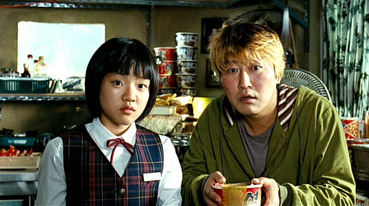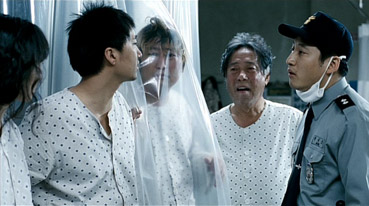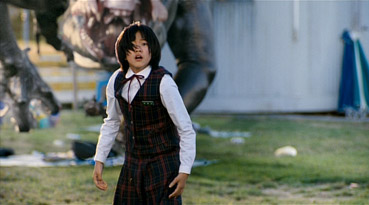|
In
February 2000, 58-year-old Albert McFarland, a civilian
employee of the US military based in the South Korean capital
of Seoul, was accused of ordering a Korean subordinate to
dump 24 gallons of formaldehyde into the Han River, the
prime source of drinking water for the city's twelve million
inhabitants. The case prompted local outrage and protests calling for the withdrawal of American troops from South Korean soil.
The US military maintained that the chemical posed no threat
to public health, but environmentalists insisted that it was potentially cancer-producing and deadly to
marine life. If director Bong Joon-ho's latest film is anything
to go by, it may have been responsible for something
else entirely.
The
Host [Gwoemul] kicks off with
a virtual recreation of the McFarland incident, which acts
as both a pointer to one the film's underlying themes (there
are several) and a prologue whose consequences we are introduced
to at an unexpectedly early stage. Bong leaves it to
us to connect the two incidents, relying on our knowledge
of horror film history and our concerns about the effects
of pesticides, chemical waste and genetic engineering to
fill a narrative gap that would once have been provided
by spectacled scientific characters making suppositions about
terrible mutation. Yes, The Host is a monster
movie, a GREAT monster movie. But it's also a whole lot
more.

The
first three members of the family at the film's core, the
Parks, are broadly but very effectively sketched in a matter
of minutes. Elderly Hie-bong (played by Byeon Hie-bong) runs a small
food stall located on the bank of the Han River. He's assisted
by his lethargic, 30-something son Gang-du (Song Kang-ho),
whose wife has long since departed, leaving him in charge of their
only daughter, Hyuen-seu (Bae Du-na). Although devoted to
Hyuen-seu, Gang-du is otherwise given to incompetence and
extended narcolepsy, often when on duty
at the food stall, a trait wonderfully introduced when his father
arrives just in time to conduct a sale and has to
lift his son's sleeping head off the counter and peel the
coins from his cheek. Sent down to the riverside to deliver
food and drink to a customer, Gang-du joins a crowd that has become intrigued by something
that can be seen dangling from the nearby bridge that then drops
into the river. Is it a marine animal? Hard to be sure. When Gang-du tosses a
can of drink into the water and it is quickly pulled under,
the other spectators quickly follow suit. This time the creature ignores the
offered snacks and instead leaps out of the river and attacks the terrified and fleeing people.
Even
by the let's-get-down-to-it approach of more recent Hollywood
works such as War
of the Worlds, The Host is
surprisingly quick out of the starting gate, its monster
unleashed and in full view just minutes into the main story.
But Bong is not doing this to show off his creature – his
relentlessly mobile camera aligns itself instead to the fleeing Gang-du and his terrified compatriots, with the creature
appearing and disappearing as it runs into their line of
sight, slips down the riverbank or, in a particularly
neat bit of compositing, is observed from the window of
a passing train. When Hyuen-seu emerges unknowingly from
the family trailer, Gang-du grabs her hand and pulls her along with him, but in the general panic the two are momentarily separated and the panicking Gang-du then grasps the wrong hand, realising his mistake just too late to save Hyuen-seu from being
scooped up by the creature and pulled down into the river.
At
the mass funeral for those who have been killed by the creature, Gang-du
is re-united with his sister Nam-joo, a national archery
medallist who froze at a crucial moment during a recent competition,
and brother Nam-il, a grumpy college graduate who is searching for a job and a purpose to his life. When it is revealed
by the authorities that the creature is actually a host
for a SARS-like infection, the entire family are quarantined at a military hospital.
They've not been there long when Gang-du gets a phone
call that reveals that his daughter is still alive, and the Parks
become determined to find and rescue her from the sewer
in which she and others are being ominously stored.

Now
I should state up front that the title creature is a CGI
creation, and although wonderfully designed and animated,
the CG does show in the way that so many such effects just tend to do. But I'm prepared to swallow
a lot if the surrounding meat is more than just set-dressing
and that's certainly the case here. The host itself
is a fascinating beast, a blend of Predator, the shark from Jaws, and the Tremors sand worms, and graced with the speed
and agility when on land of an angry and overweight velociraptor
crossed with an Olympic gymnast. It certainly proves solid
enough to present a tangible threat and, later in the story,
deliver a couple of world class jolts – this may be
the first time CGI has actually made me seriously jump.
Unlike films in which the monster is the sole draw, the
drama is so involving and characters are so well drawn (most
of the main cast were just as compelling in Bong's equally
excellent Memories
of Murder) that rather than look forward to
the beast's next appearance you actually come to dread it.
Inevitably, the creature has allegorical status, from the
obvious warnings of the consequences of industrial pollution
to becoming an unexpected symbol of Korea's underclass. In a narrative
sidestep that is very neatly dovetailed back into the main
story, a poor man takes his young son on a food raid and
justifies their actions by telling the boy of so-rei,
a right of the hungry; seconds later, the pair are confronted
the creature, one created by man's folly and now exercising
its own form of so-rei.
Humour is employed both for character engagement and as part of the film's varied emotional tapestry, which Bong weaves into the narrative with unblinking confidence, allowing the tragic to evolve into the comedic in the space of a few short seconds (the initially sad funeral that dissolves into hilariously overwrought histrionics is particularly good example). There are even gags placed purely for genre fans to savour – Bong clearly knows his horror movies and at times appears to lining up the clichés purely to shoot them down. Thus a girl who is locked out of a seemingly safe haven when the monster attacks is not eaten as expected but the only one spared when the creature bypasses her and ploughs into the shelter, while a military official who switches on the TV for one of those news broadcasts that always seem to be playing when exposition is needed is unable to find one on any channel, despite a frustrated search.
That's
not to say familiar elements are excluded, but when they
do appear they always feel organic to the narrative, often on more
than one level. Where western horror films, for instance,
repeatedly recycle the same contrivance for robbing characters
of their ever-present mobile phones (no signal,
somebody smashes it), Bong incorporates the ownership of such a phone into both the
plot and the subtext. Young Hyuen-seu doesn't have one because her hard-up father can't yet afford to buy
one for her, and the bucket of coins he has saved for this very purpose
is eventually used instead to bribe an official. Further layering
is provided when Gang-du uses his own phone as a stand-in for his daughter when trying to explain to disinterested
officials how she could have survived being grabbed by the
monster. Even the main characters initially fall wide of
expectations – effecting an escape from the hospital and
tooling up to search of the monster's lair, their lowly
funds leave them short of equipment and they soon realise they
have no idea where to start looking for Hyuen-seu. Their initially fruitless search sees them individually incapacitated by a combination of
bad luck and poor foresight, while the sheer size of the Seoul
sewer system surprises them in a way that, with a little
reasoning, it really should not have.

The
Host delivers in a way few monster movies have since
the golden days of 1950s Hollywood genre works.
With its deft blending of horror, comedy, personal drama, coupled with its socio-political and cultural subtext, it's
considerably more sophisticated and satisfying than most,
and I've only touched on wealth of character and allegorical
detail that pack this remarkable film. There's no two ways
about it – The Host is, quite simply, an
absolute belter, as smart as it is entertaining and easily
the best monster movie to emerge from anywhere since Alien.
Framed 1.78:1 and anamorphically enhanced, this is a pin-sharp
transfer with excellent contrast and colour reproduction,
given the minor games played with the colour palette that
are almost expected in modern genre works. Black levels
are perfect and compression artefacts rare. One advantage
of being a film-only disc is that the bitrate is consistent
high, often peaking at maximum.
The
Korean DTS 5.1 track is and well mixed, the surrounds well
used for location background souns and there is some effective
separation of voices, sound effects and music. The bass
kicks when it needs to, notably the creature's footsteps
and the drumbeats of the score. An excellent track. The
5.1 is not quite as lively, but still very effective if
you crank the volume up a bit. A Cantonese stereo 2.0 dub
has also been included.
The
English subtitles have no obvious spelling or grammar issues,
though are Americanised – the coins in Gang-du's pot are
described as "quarters and dimes," a currency
I that was not aware was standard in Korea (but who knows, maybe this is
the correct translation of another sly comment about stationed
American servicemen.) The subtitles appear on all of the
dialogue, including lines delivered in English.
Not
a thing – you only get the movie on this disc.
A knockout movie that looks and sounds great on this Hong Kong region 3 DVD from CN Entertainment, the only down side being the complete lack of extras. The film's huge success in Korea and other Far Eastern territories has ensured that there are already a number of DVD releases available (I've counted six so far), including KD Media's 'Limited Complete Edition', a 4-disc set that includes three commentaries, a lorry-load of extra features and the soundtrack CD, though it seems unlikely the extras will be subtitled in English. CN Entertainment's release is at the other end of the scale, a lot cheaper but devoid of supplementary material. Possibly the best compromise for UK viewers not fluent in Korean is Optimum's upcoming 2-disc region 2 release, which includes its own impressive collection of extras that will be subtitled in English. The only question unanswered at present is how the picture and sound will match up, something we will be covering when it appears. If you're not bothered about extra features and have a multi-region player, then CN Entertainment's DVD can be found at about half what you'll pay for the Optimum disc, and in that respect is good value.
|